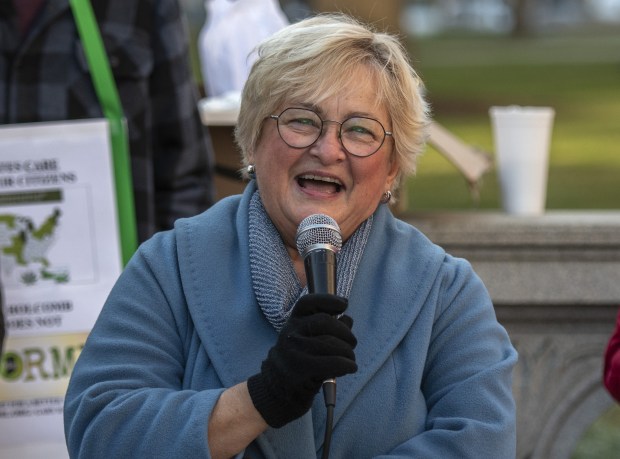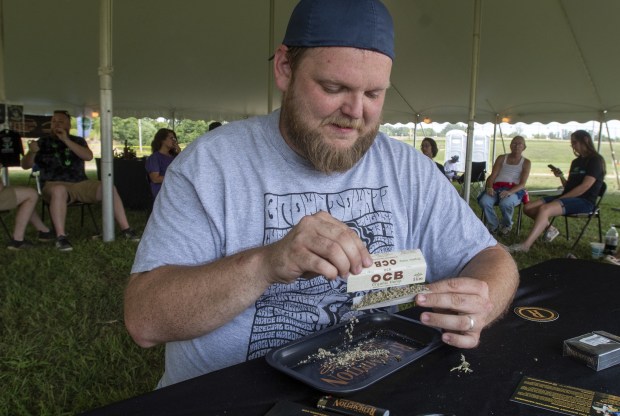As the federal government signals a shift in marijuana classification, area Indiana legislators have little faith it will influence the state to take action toward legalizing marijuana in some form.
The U.S. Drug Enforcement Administration will move to reclassify marijuana as a less dangerous drug, the Associated Press reported Tuesday.
The proposal, which still has to be reviewed by the White House Office of Management and Budget, would recognize the medical uses of cannabis and acknowledge it has less potential for abuse, but it would not legalize marijuana for recreational use.
Marcus Safirt, of Michigan City, Indiana, rolls a joint during The Original Cannabis Crown at the Hartford Motor Speedway in Hartford, Michigan Friday August 27, 2022. The Original Cannabis Crown is a two-day event featuring cannabis products, live music, art and vendors. (Andy Lavalley for the Post-Tribune)
Indiana has become a marijuana island, as Illinois and Michigan allow for medical and recreational use. In Ohio, medical marijuana was legalized in 2016 and voters in November approved a measure to legalize recreational use, while in Kentucky medical marijuana will be legal in January 2025, according to the respective state agencies.
Gov. Eric Holcomb has maintained throughout his tenure that he would not take action to legalize marijuana in the state while it remained illegal at the federal level.
Rep. Mike Ayelsworth, R-Hebron, and Rep. Hal Slager, R-Schererville, both said they haven’t heard from the Republican caucus about supporting legalizing marijuana in Indiana, in any form, since the federal action was announced.
“I don’t see that (the federal action) changes anything as far as the benefits of legalizing it,” Slager said. “This is one more attempt at politics, at currying votes with certain people.”
Former State Sen. Karen Tallian said the DEA action “has the possibility of helping” Indiana legalize medical marijuana, which would align with the proposed federal action. But, that would depend on who is elected the next governor, as Holcomb leaves office in January, she said.
“There’s no excuse not to do a medical program,” Tallian said. “We’re behind the times.”

Tallian said when she was in the legislature for 16 years she proposed many pieces of legislation to legalize marijuana. At the start of the 2020 legislative session, Tallian was the only legislator to speak at a rally outside of the statehouse calling for marijuana reform in the state.
“When I was there, the Republicans did everything they could do to not have their people vote on it,” Tallian said.
Initially, Tallian said she was the only legislator filing legislation to legalize marijuana. In the last few years of her tenure, Tallian said other legislators started filing similar bills.
“I don’t think that the number is going to get smaller,” Tallian said.
State Sen. Rodney Pol, D-Chesterton, said in a statement he would’ve liked to see the federal government legalize marijuana and include restorative justice elements in its implementation, but said the DEA’s action was a “step in the right direction.”
With this possible action, Pol said it will change the way Indiana legislators talk about legalizing marijuana.
“When I talk to my colleagues about marijuana now, it will no longer be in a category with other drugs we can all agree to be purely harmful and addictive substances,” Pol said. “The rescheduling of marijuana gives us a new place to restart that conversation.”
Pol said he hopes the Republican supermajority will pay attention to this federal action.
“For too long, communities of color, struggling veterans, and countless people suffering from a variety of serious conditions in our state have suffered under our draconian approach to marijuana. We spend way too much money putting people in jail instead of collecting tax revenue off of legal sales to help people,” Pol said.
Aylesworth said he supports legalizing medical marijuana because studies have shown it helps veterans manage their PTSD symptoms. But, Aylesworth said he does not plan on proposing legislation to legalize medical marijuana.
When it comes to recreational marijuana use, Aylesworth said he hasn’t yet decided how he feels about that measure because he’s heard various arguments for and against recreational use.
While the Republican caucus hasn’t yet discussed marijuana since the federal action, Aylesworth said it’s likely it will in the coming months.
“I imagine we will later in the summer,” Aylesworth said.
While many marijuana legalization bills have been proposed in the legislature, Slager said, the majority of the caucus doesn’t support the measure. Until the Food and Drug Administration determines the medical benefits of marijuana, it’s unlikely the legislature will move forward with legalizing marijuana, he said.
Slager said there are no benefits to legalizing marijuana other than an increase in revenue for the state.
“I don’t believe that the state should be in the business of gaining tax revenue at the cost of other things,” Slager said.
akukulka@chicagotribune.com



